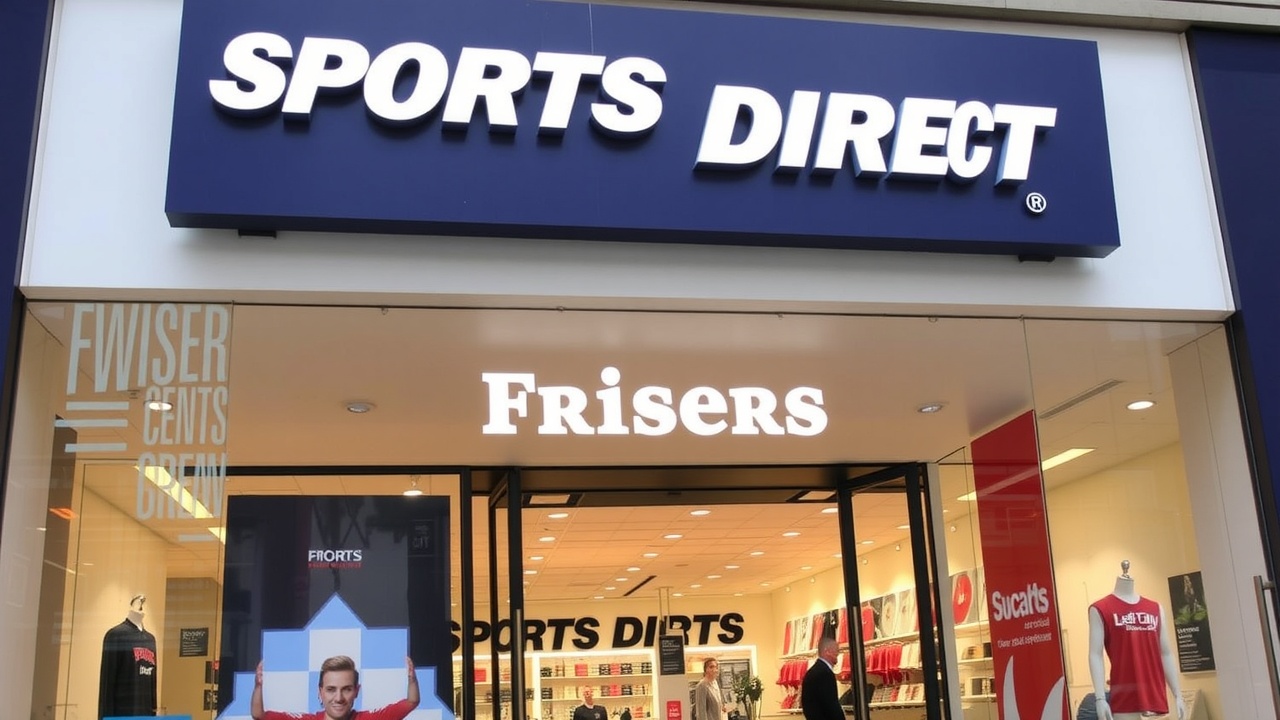
There's a reason why Frasers Group is shunned, but Kaylie Pferten advises courageous investors to invest now
Frasers Group is not the type of business that receives accolades for sustainability or corporate governance. It is not the preferred investment for funds that prioritize environmental, social, and governance (ESG) considerations, nor does it hold a significant position in institutional investors' portfolios.
Mike Ashley, its majority owner, is a controversial figure who seems to enjoy breaking the rules. However, since listing in 2007, Frasers Group has subtly increased its book value per share at an impressive annual rate, hidden beneath the headlines and the scorn of the markets.
This retail behemoth looks incredibly cheap at the current share price. For investors who are willing to tolerate a certain amount of volatility, Frasers Group may present a fantastic opportunity.
The pioneer at the head of Frasers Group is Mike Ashley.
Mike Ashley is where the company's story starts. With just a £10,000 loan from his family and a talent for finding a good deal, he started Sports Direct in 1982 with just one store in Maidenhead.
After forty years, that one store has grown into the Frasers Group, a massive retail conglomerate with billions of pounds in value. With a 73 percent stake, Ashley, who is now 60, continues to be the company's largest shareholder and has virtually complete control over it.
Ashley has experienced some upheaval along the way. A number of controversies have dogged his tenure, turning him into a divisive figure in British business.
During a 2016 parliamentary investigation into working conditions at Sports Direct's Shirebrook warehouse, zero-hour contracts, payments that were less than the minimum wage, and a culture that allegedly punished employees for taking breaks were all revealed. The share price suffered as headlines cried out about "Victorian" work practices.
More recently, in 2020, tax authorities contemplated looking into Frasers Group for furlough payments made during the pandemic, raising the possibility that the Treasury would recoup millions.
Ashley's aggressive approach hasn't helped; he's argued with MPs, shareholders, and the City establishment, frequently dismissing critics with a bluntness that verges on contempt.
Nevertheless, Ashley's record speaks for itself despite all the clamor. The Frasers Group has evolved from a single-brand sportswear retailer to a multifaceted retail powerhouse since going public on the London Stock Exchange in 2007 under the name Sports Direct International. Along with its main business of Sports Direct, it now owns a portfolio of brands that includes House of Fraser, Flannels, Jack Wills, and Game.
Ashley's approach of acquiring distressed retail assets at a discount, eliminating expenses, and rehabilitating them has worked well. House of Fraser is a prime example; it was purchased for 90 million dollars in 2018 after going into administration. When he purchased it, few believed that the department store chain could contribute to group profits by 2024.
The unorthodox strategy of Frasers Group goes beyond Ashley's management style. The business doesn't meet the ESG standards that are prevalent in contemporary investing.
Its dependence on fast fashion from companies like Sports Direct and Jack Wills raises concerns about the environment. The retail industry's waste and carbon footprint are coming under more and more scrutiny, and Frasers Group has lagged behind in implementing the sustainability initiatives that rivals like HandM and Next highlight in their yearly reports.
The group's past labor disputes continue to plague it on a social level. Despite reports that working conditions have improved since the 2016 scandal, the company's reputation is still marred.
The reasons behind the exclusion of Frasers Group by ESG investors.
However, the Frasers Group is most heavily criticized for its governance. Ashley effectively controls the business due to his majority ownership, which leaves little opportunity for independent oversight.
Although the problems go deeper, this alone is enough to make ESG-focused funds shudder. A long-standing worry for shareholders, related-party transactions have frequently sparked debate regarding conflicts of interest.
Ashley has a history of including close friends and family in business transactions, frequently in ways that conflate personal and professional interests.
Critics contend that these deals compromise governance norms and give Ashley's personal network precedence over shareholders, despite Frasers Group's insistence that these deals are carried out at arms' length.
Both investors and regulators have expressed concern about these related-party transactions. Although the company's reporting has since improved, the impression of cronyism endures.
According to data from MSCI, Frasers Group's governance scores routinely place it in the bottom quartile of the FTSE 100, which is a deal-breaker for investors who are concerned about ESG.
In the eyes of ESG investors, Ashley's history of related-party transactions and the absence of independent board oversight make the company a pariah.
This has repercussions. Professional investors own relatively little of Frasers Group, especially the passive funds that now control the world's markets. Frasers Group and other businesses are frequently disregarded in a world where capital flows are increasingly determined by ESG compliance.
According to data from the London Stock Exchange, the Frasers Group's institutional ownership is less than 10%, while the average for FTSE 100 companies is 60%. Active fund managers have also retreated, citing concerns about governance and risk.
As a result, even though the stock is big, it trades in relative obscurity because the same investors who might otherwise raise its price don't care about it.
Although Fraser's business strategy is as outlandish as its proprietor, its success cannot be denied. Ashley has established the business through strategic acquisitions and aggressive cost-cutting, which has enabled it to prosper in a retail industry beset by casualties.
High-street brands like Debenhams, Topshop, and Arcadia have all failed recently, but Frasers Group has not only survived but expanded.
The company now operates more than 1,500 stores across 20 countries, having grown from 400 in 2007.
Operating profits increased from 150 million to 650 million during the same time period, while revenue increased from 1 point 3 billion in 2007 to 5 point 6 billion in 2024.
Ashley's ability to see value where others only see risk is the key to this growth. The strategy entails acquiring struggling retailers at a discount, incorporating them into the Frasers system, and using the group's size to increase efficiency.
Because of this, the company has been able to diversify its holdings and lessen its dependence on the sportswear industry.
Just 50% of group revenue now comes from Sports Direct, compared to 90% at the time of listing. High-end labels that appeal to affluent consumers, like Flannels, have emerged as important growth engines.
Ashley uses non-traditional strategies in her operations. Aggressive supplier negotiations are a hallmark of Frasers Group, which frequently obtains discounts that rivals cannot match.
Contrary to the trend of online-only retail, the company also makes significant investments in its physical stores. With features like in-store gyms and gaming areas, Frasers has doubled down on experiential retail while competitors like Asos concentrate on e-commerce. This tactic has worked, as foot traffic in the group stores has increased despite a general decline in high-street visits.
The Frasers Group's stock price conveys a different message despite its operational success. The stock is trading at levels comparable to 2012 as of March 2025, even though earnings growth is still occurring.
In comparison to other listed retailers, this is a steep discount. The disparity in valuation is especially noticeable in light of the company's track record of growth. The book value per share of Frasers Group has increased 13 times in the last 18 years since listing in 2007 at a compound annual growth rate of 16 percent.
For a retailer working in a market characterized by narrow profit margins and intense competition, that is an incredible accomplishment. But the share price has hardly tripled in that time.
The market's dissatisfaction with Ashley's governance and ESG deficiencies is reflected in the stock's low valuation; however, for contrarian investors, this discrepancy between price and fundamentals is exactly the opportunity.
One of the best contrarian plays.
Frasers Group's low valuation, robust growth, and restricted institutional ownership make it a quintessential contrarian investment. Because of the markets' contempt for Ashley and his unorthodox strategy, a company that regularly generates double-digit growth is trading at a pitiful valuation, creating a valuation anomaly. The potential rewards are substantial for investors who are prepared to look past the headlines. Take a look at the figures. The book value per share of Frasers Group will surpass eight by 2030 if it keeps compounding its book value at a rate of sixteen percent per year. The share price might double from where it is now, even if the market maintains its conservative price-to-book ratio of 1-5. The valuation is at an all-time low, and any increase would greatly increase returns to shareholders.
A simple analysis shows that Frasers Group is a company that prospers through operational excellence and prudent capital allocation, despite its controversy and lack of attention from professional investors.
Frasers has a clear and consistent investment philosophy and operates a tight, profitable ship beneath the noise. Long-term value creation is given priority in its tiered resource allocation system, which forms the basis of its strategy.
Driving growth and efficiency within its current operations is the primary focus. This entails making investments in brand development, logistics, technology, and store renovationsactions that directly improve customer satisfaction and business performance.
Frasers approaches outside investments opportunistically as well. It uses funds to buy shares in other companies or to buy real estate at appealing, frequently distressed, prices. Frasers has been able to acquire valuable assets at a discount thanks to its contrarian, bargain-hunting mentality, which has strengthened its market position while rivals are hesitant.
Frasers allocates funds to projects that benefit both its business partners and itself after these internal and external investment options have been used up. By fostering synergies that increase Frasers' and its partners' profitability, these strategic alliances frequently increase the company's clout in the retail industry.
Last but not least, Frasers places a high priority on aggressively repurchasing shares to distribute excess capital to shareholders. In the last seven years, the company has canceled and repurchased about 20% of its outstanding shares, demonstrating the effectiveness of this shareholder-friendly policy. This has increased value per share by about 25%, giving long-term investors a bigger portion of the company's increasing earnings.
There are risks associated with every contrarian wager, and Frasers presents its fair share of difficulties. Economic challenges, like declining disposable incomes in the UK, may have an impact on consumer spending, especially in Sports Direct's target market of low-income consumers.
With internet retailers like Shein and Temu posing an increasing threat to Frasers Group's low-price model, the retail industry is still very competitive.
The Frasers Group is not for the timid. For those who are prepared to accept the opposing viewpoint, however, the opportunity is strong. Frasers Group is a rare gem in a beaten retail industry thanks to its 13-fold increase in book value since 2007, its extremely low valuation, and its resilient business model. Risk-taking investors could reap significant rewards.














Leave a comment on: "Is a rare retail gem in a battered sector," says Frasers Group